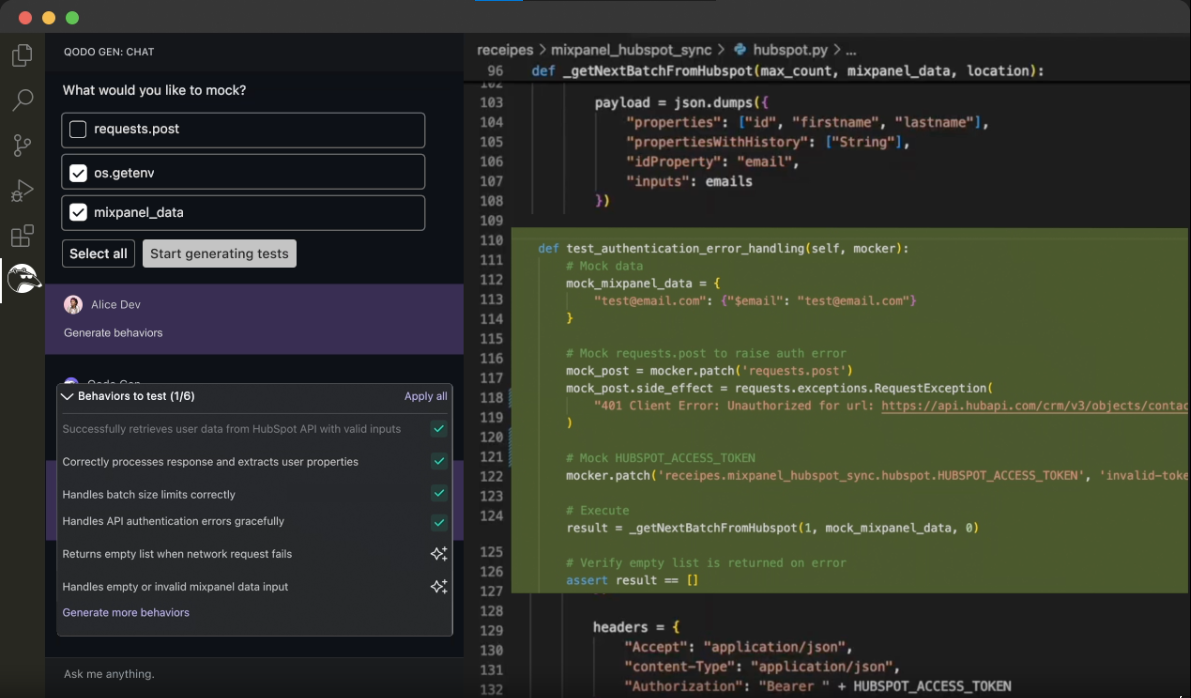Qodo (formerly Codium) has just released their new open-source code embedding model that's turning heads in the software development world. At just 1.5 billion parameters, their Qodo-Embed-1-1.5B model is punching well above its weight – outperforming much larger models from OpenAI and Salesforce while requiring significantly fewer computing resources.
Smart code generation

(Image Source: Qodo)
Qodo's platform offers comprehensive solutions across the entire development workflow, including intelligent code generation that's tightly integrated with your existing codebase.
Their IDE integrations allow developers to generate quality code with meaningful suggestions that understand the surrounding context. This isn't just generic code completion – Qodo's tools tap into your organization's best practices and coding standards, ensuring new code aligns perfectly with existing patterns.
Better testing
Perhaps most impressive is Qodo's approach to automated testing. Rather than saddling developers with the tedious task of writing test cases, Qodo can generate comprehensive tests that cover both happy paths and edge cases – dramatically improving code coverage with minimal effort.
Developers simply define their coverage goals, and Qodo handles the rest, creating tests that catch potential bugs before they reach production. This focus on quality assurance throughout the development pipeline helps teams maintain bulletproof code without slowing down delivery schedules.
Code Improvement

(Image Source: Qodo)
Qodo offers powerful chat-based capabilities for improving existing code. Developers can request assistance to clean up messy functions, identify potential bugs or security vulnerabilities, and automatically generate thorough documentation.
These features create a seamless experience where AI assistance is available at every stage – from initial code writing through testing, optimization, and documentation – all while maintaining the context awareness that only a sophisticated embedding model can provide.
Enterprise-scale solutions
For enterprise teams drowning in millions of lines of code, this release couldn't come at a better time. While flashy code generation features get all the headlines, Qodo's CEO Itamar Friedman argues that proper code retrieval and understanding are what actually matter for large-scale software development.
"Enterprise software can have tens of millions, if not hundreds of millions, of lines of code," Friedman explained in a recent interview. "Code generation alone isn't enough — you need to ensure the code is high-quality, works correctly and integrates with the rest of the system."
Impressive performance metrics
The real-world numbers back up Qodo's claims. On the industry-standard Code Information Retrieval Benchmark, their nimble 1.5B model scored 70.06, beating out Salesforce's SFR-Embedding-2_R (67.41) and OpenAI's hefty 7-billion-parameter text-embedding-3-large (65.17).
This efficiency breakthrough means development teams can run advanced code retrieval on affordable GPU hardware, making AI-powered code search accessible without breaking the bank.
The Challenge of Similar Code
One of the trickiest problems in code embedding is handling functions that look nearly identical but do completely different things. "Two nearly identical functions — like 'withdraw' and 'deposit' — may differ only by a plus or minus sign," Friedman points out. "They need to be close in vector space but also clearly distinct."
Getting this wrong can lead to serious bugs when AI systems retrieve similar-looking but functionally opposite code snippets. Qodo tackled this by creating a unique training methodology that combines synthetic data with real-world code samples, teaching their model to spot these critical nuances. The approach has impressed industry partners, with both Nvidia and AWS planning technical blog posts about Qodo's methodology.
Language Support
Qodo has optimized their model for the top 10 programming languages used in enterprise environments (including Python, JavaScript, and Java), while still offering support for many others. "Many embedding models struggle to differentiate between programming languages, sometimes mixing up snippets from different languages," Friedman noted. "We've specifically trained our model to prevent that."
Availability
The 1.5B model is available now on Hugging Face under an OpenRAIL++-M license, allowing developers to freely integrate it into their workflows. For those needing more horsepower, Qodo offers larger versions under commercial licensing.
Organizations wanting a fully managed solution can access Qodo's enterprise platform, which keeps embedding models updated as codebases evolve – a crucial feature for maintaining accuracy over time.
Beyond Hugging Face, the model will soon be available through Nvidia's NIM platform and AWS SageMaker JumpStart, making enterprise adoption even simpler.
Conclusion
As AI coding tools mature, the industry focus is shifting from just generating code to truly understanding and managing it. Qodo's revolutionary approach represents a paradigm shift by focusing on code understanding rather than just generation, addressing real challenges facing enterprise development teams. The success of their compact yet powerful model demonstrates that bigger isn't always better in AI – sometimes smart design and focused training can deliver exceptional results with far fewer resources. For teams managing massive software ecosystems, Qodo offers practical, high-performance solutions for smarter code search, generation, testing, and quality control without requiring enterprise-sized GPU budgets, making this a true game-changer for organizations looking to harness AI efficiently.



